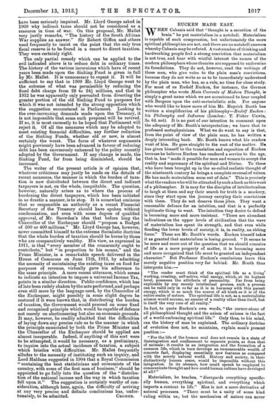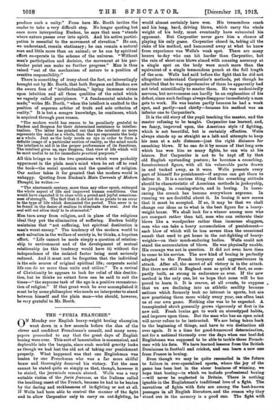EUCKEN MADE EASY.
WHEN Cabanis said that "thought is a secretion of the brain " he put materialism in a nutshell. Materialism is capable of such compression, but unfortunately the more spiritual philosophies are not, and there are no nutshell answers whereby Cabanis may be refuted. Avast number of thinking and hardworking people feel a strong conviction that materialism is not true, and hear with wistful interest the names of the modern philosophers whose theories are supposed to undermine its foundations. They do not, however, read the writings of these men, who give voice to the plain man's convictions, because they do not write so as to be immediately understood by the plain man, who has, as a rule, no time for close study. For most of us Rudolf Eucken, for instance, the German philosopher who wrote Main Currents of Modern Thought, is simply a great name which we are accustomed to bear coupled with Bergson upon the anti-materialistic side. For anyone who would like to know more of him Mr. Meyrick Booth has written a simplification of his philosophy—Rudolf Eucken : his Philosophy and Influence (London : T. Fisher Unwin, 3s. 6d. net). It is no part of our intention to comment upon the adequacy of Mr. Booth's interpretation; we leave that to professed metaphysicians. What we do want to say is that, from the point of view of the plain man, he has written a deeply interesting book. Mr. Booth knows what his readers want of him. He goes straight to the root of the matter. Ha has given himself to the translation and exposition of Eucken because he believes Eucken has rendered a service to the age, that is, has " made it possible for men and women to accept the reality and supremacy of the spiritual and Divine. To those who have been brought up in the so-called realistic thought of the nineteenth century he brings a complete reversal of values. He has made materialism seem out of date." This is precisely what the readers who will be attracted by such a book as this want of a philosopher. It is easy for the disciples of intellectualism to laugh at them and say their search for truth is a mockery, since they start upon the journey carrying their convictions with them. They do not deserve these jibes. They want a reasonable defence for an intuition, and that is a perfectly legitimate thing to want. The intuition they desire to defend is becoming more and more insistent. "There are abundant indications on the upper levels of civilization that the wave of materialism has spent its strength, and that even while flooding the lower levels of society, it is, in reality, an ebbing force." These are Mr. Booth's words. Eucken himself takes it as granted that materialism is losing ground. " It seems to be more and more out of the question that we should conceive of life as a mere property of matter, it is becoming more and more recognized that life must be granted an independent character." But Professor Eucken's conclusions leave this merely negative position very far behind. Mr. Booth thus interprets him :— " The reader must think of the spiritual life as a living working, creating, self-active, vital energy, which, at its highest level, possesses the attribute of personality. Far from being explicable by any merely intellectual process, such a process can be valid only in so far as it is in harmony with this parent energy, which is as much the source of all truth as it is of the entire realm of nature. The spiritual life is not, as a materialistic science would assume, an annexe of a reality other than itself, but is itself the very core of all reality."
In fact, to quote Eucken's own words, "the corner-stone of all philosophical thought and the axiom of axioms is the fact of a world-embracing spiritual life." Only thus, to his mind, can the history of man be explained. The ordinary doctrine
of evolution does not, he maintains, explain man's present position :—
" For the life of the human soul does not remain in a state of disintegration and confinement to separate points, as does that of animals : it results in an integration and the formation of a common life, which in turn develops an immeasurable wealth of concrete fact, displaying essentially new features as compared with the merely natural world. History and society, in their distinctively human sense, would be impossible without this integration. In its absence, how could speech be employed to communicate thought and how could human culture have developed at all ? "
Materialism, he teaches, "disregards everything specific- ally human, everything spiritual, and everything which imparts a content to life." Man is not a mere derivative of natural processes. "There must be a unity of some kind ruling within us ; but the mechanism of nature can never
produce such a unity." From here Mr. Booth invites the reader to take a very difficult step. No longer quoting but once more interpreting Eucken, he says that man " stands where nature passes over into spirit. And his active partici- pation is essential to the movement of elevation." He can, we understand, remain stationary ; he can remain a natural man and little more than an animal; or he can by spiritual effort co-operate in the scheme of the universe. "Without man's participation and decision, the movement at his par- ticular point can make no further progress." Man is thus raised "out of the mechanism of nature to a position of creative responsibility."
There is something of irony about the fact, so interestingly brought out by Mr. Booth, that both Bergson and Eucken are the sworn foes of " intellectualism," laying immense stress upon intuition and all those qualities of the mind which we vaguely called percipience. "A fundamental mistake is made," writes Mr. Booth, " when the intellect is exalted to the position of supreme arbiter of truth and sole criterion of reality." It is but a meagre knowledge, he continues, which is acquired through pure reason.
"The modern world has reason to be peculiarly grateful to Eucken and Bergson for their determined resistance to intellec- tualism. The latter has pointed out that the intellect no more represents the mind as a whole, than the eye represents the body as a whole. Just as the body needs an eye in order to form a definite image of a particular section of reality, so the mind needs the intellect to aid it in the proper performance of its functions. The intellect gives us, says Bergson, that view of life which will be most useful to us for immediate practical purposes."
All this brings us to the two questions which were probably uppermost in the plain man's mind when he set off to read the book—the social question and the question of religion.
Our author takes it for granted that the modern world is unhappy. Quoting from Eucken's Main Currents of Modern Thought, he writes :— " The nineteenth century, more than any other epoch, enlarged the whole aspect of life and improved human conditions. One would have expected it to close with a proud and joyful conscious- ness of strength. The fact that it did not do so points to an error in the type of life which dominated the period. This error is to be found in the desire of realism to eliminate the soul. And the soul will not allow itself to be eliminated."
Men turn away from religion, and in place of the religious ideal they put the elimination of suffering. Eucken boldly maintains that "not suffering, but spiritual destitution is man's worst enemy." The tendency of the modern world to seek salvation in the welfare of society is, he thinks, a hopeless effort. " Life cannot be made simply a question of relation- ship to environment and of the development of mutual relationship (as this tendency would have it) without the independence of the isolated factor being most seriously reduced. And it must not be forgotten that the individual is the sole source of original spiritual life; corporate social life can do no more than unite and utilize." To a revival of Christianity he appears to look for relief of this destitu- tion, but he thinks no extant form can be said to suit the times—" the supreme task of the age is a positive reconstruc- tion of religion." If that great work be ever accomplished it must be by some philosopher who needs no interpreter to stand between himself and the plain man—who should, however, be very grateful to Mr. Booth.



























































 Previous page
Previous page